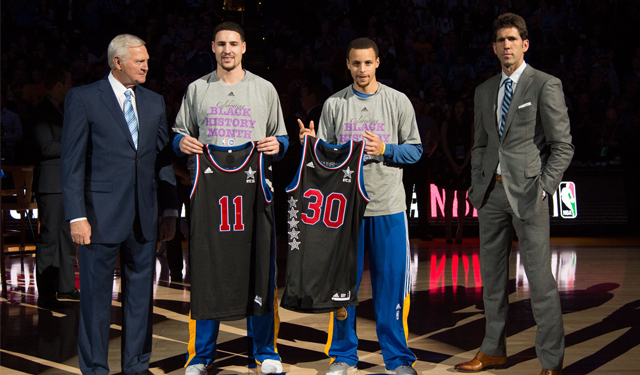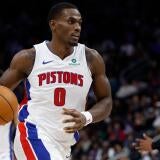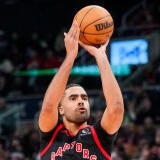
Warriors' Bob Myers patiently built the next influential team model
Warriors' general manager has done a masterful job of setting the new standard in the NBA.
CLEVELAND -- "I started [covering the team] during the Mike Montgomery years," a beat writer covering the Golden State Warriors said to me Tuesday night after the organization won its first championship since 1975. "That was a long way from this."
The Warriors organization isn't a storied franchise in the NBA. At least, it hasn't been since our basketball stories started getting typed out on computers in arenas every night. Heading into the 2014-15 season, the Warriors were pushing into their 40th season since their last championship ceremony and they weren't perennially heartbroken in the playoffs. They weren't perennially in the playoffs at all.
Golden State had only reached the playoffs 10 times in those 39 years and hadn't even pushed through to the Western Conference finals since 1976. It was a bumbling organization. It was an organization that selected incredible top of the lottery talent, had fun teams, and yet couldn't find appearances in the postseason. It wasn't like they were just one player away from being great. They were one unified vision of team-structuring away from becoming an enviable position every season.
In 2010, Joe Lacob purchased the team from Chris Cohan for $450 million. Cohan had owned the team since 1995 and in his time as owner, the Warriors saw one postseason appearance. It was a poorly run, often incompetent organization that couldn't get out of its own way. Lacob needed to clean house and in doing so, he needed to find someone who could build a culture of winning basketball that would be able to stand through adversity and not collapse from a mild breeze like a house of cards.
Bob Myers was a successful sports agent, managing the negotiations and careers of nearly 20 players in the NBA. He was the agent for two Rookie of the Year winners (Brandon Roy and Tyreke Evans) and had negotiated hundreds of millions of dollars for his clients. In meeting Joe Lacob and Peter Gruber, Myers had developed a respect for the Warriors' new ownership and had wondered what it would be like to work for two progressive businessmen on the other side of the negotiating table.
In April 2011, Myers left his very successful role as sports agent and was hired as the assistant general manager and vice president of basketball operations for the Warriors. He was going to learn from Larry Riley and eventually take over down the line. What transpired though was an intelligent view of roster-building that couldn't be delayed any longer. Myers' vision for what the Warriors could and should look like embodied all of the forward-thinking Lacob wanted to bring to the franchise.
Just a year after joining the front office, he was promoted to general manager and Riley was moved to director of scouting. It was still Lacob's team and the front office would work as one, but Myers was the front man for working out his vision of the team. He was flanked by veteran minds of the industry in Jerry West, Rick Welts, and Travis Schlenk. And he was tasked with making the Warriors a perennial playoff powerhouse, rather than a lottery mainstay.
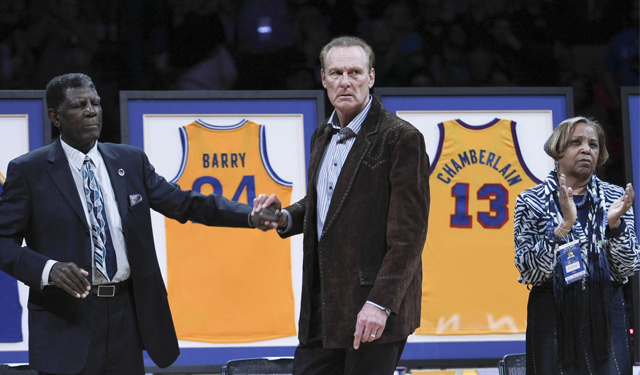
Trusting the future of the organization in Steph Curry's hot hand
During Myers' first year as a front office executive, the Warriors made a trade that wasn't widely well-received by the Warriors' fan base. They moved fan favorite Monta Ellis along with Kwame Brown and Ekpe Udoh for Andrew Bogut and Stephen Jackson. Bogut was an oft-injured defensive big man and Monta was a highlight reel of inefficient scoring that excited a raucous crowd not expecting too many wins.
Fans booed Lacob during a jersey retirement ceremony for Chris Mullin shortly after the trade and the last Warriors' champion Rick Barry scolded the crowd. The Warriors as a franchise hadn't built up any credit for trusting their moves and you were always waiting for the direction to become lost. It was a necessary move though to get the ball in the capable hands of Stephen Curry, the future of a brighter Warriors existence.
"Well, maybe we’ll have earned a little equity now," Myers explained following the Finals. "You do the best you can. We’ll maybe draft the wrong player. I hope we don’t. We may make some mistakes this free agency. But you’ve gotta keep working at it and trust the people around you and know that if you do make mistakes, you keep going.
"Thankfully, a lot of the decisions we made worked, and a lot of it is luck. We had good health. But I’ve always felt, there’s no substitute for working hard."
The Ellis trade was a correction on a mistake made by a previous regime. Selling jerseys and getting fans to tune in or buy tickets fueled transactions. A movement toward versatility, defense, and offensive efficiency was ignored by throwing big money at players like Ellis and Andris Biedrins. A positionless NBA had been lurking for years and Myers was going to surround his franchise player with just that.
Myers' first draft as general manager of the team was an impressive grab of the supporting future of Curry. The Warriors had four picks -- 7th, 30th, 35th, and 52nd. Myers took Harrison Barnes, a high school phenom who had just spent two good but unspectacular years at North Carolina. The 30th pick was Festus Ezeli, a Nigerian center who spent four years developing at Vanderbilt and was still in need of much more development on both ends of the floor.
The second round saw the loquacious tweener forward from Michigan State Draymond Green fall to 35. Myers scooped up the first round talent sans NBA position, which ended up being a good thing. The 52nd pick was Ognjen Kuzmic out of Bosnia, who is still a development project for the organization.
Barnes wasn't going to need to come in and score right away. The Warriors has Curry, David Lee, and even second-year guard Klay Thompson to handle that. Barnes was going to earn his time under Mark Jackson and the coaching staff by becoming a trustworthy defender. Green was going to become the man who guarded everybody. Ezeli was going to have to develop into a reliable backup center for Bogut, just in case his health failed him again.
Myers and the front office were building a deep roster contingent on being a healthy squad. Bogut had health issues all over his body -- the price of being a defensive anchor forced to hunt contact. Curry's ankles had been so shaky that he accepted a franchise friendly contract extension of four years and $44 million following his third season, which was still questioned as a possibly poor decision by the organization.
The team flipped Dorell Wright for a veteran backup point guard in Jarrett Jack and signed Carl Landry to be stabilizing forces off the bench.
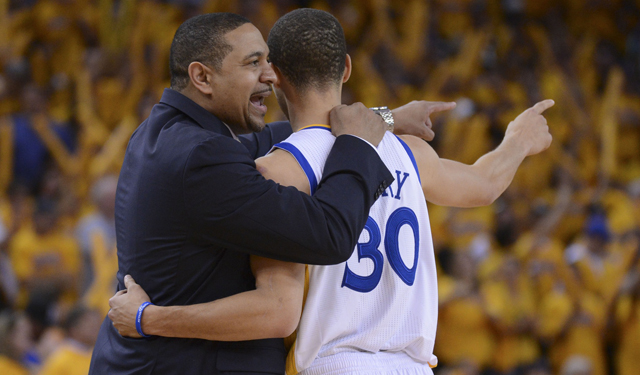
Finding the right balance between offense, defense, and selflessness
The Warriors exploded onto the scene in the 2012-13 season.
Curry's ankles didn't fail him as he set the NBA record and new offensive trend of 3-pointers made in a season. Lee was named an All-Star. Thompson found his role as the floor-spacer and perimeter threat to allow Curry the room to dance all over the defense. Bogut struggled to get on the court, but the Warriors found versatile lineups providing answers defensively -- jumping from 27th in defensive efficiency to 13th under Jackson and assistant coach Michael Malone.
Golden State made their first playoff appearance since 2007, and burned down a regular season darling in the Denver Nuggets. Curry became a star in that series, torching the Nuggets' defense while admiring his handy work as an arsonist. Players like Barnes and Green stepped up to knock down big shots when Curry was swarmed. But their success in the first round and lessons learned in a loss to the San Antonio Spurs in the second round led to expectations for them to return and improve.
In 2013-14, Myers took another big gamble in giving away potential building blocks of the future. After having just lost to the Warriors in the playoffs, defensive mastermind and all-around versatile player Andre Iguodala wanted to join Golden State.
In order to pull off such a massive sign-and-trade, Myers needed to clear cap space. The only way to do that was to offer up five future draft picks (2014 and 2017 first-round picks, and second round picks for 2016, 2017, and 2018) in a three-team deal that also required the Utah Jazz to absorb the $25 million owed to Richard Jefferson, Brandon Rush, and Biedrins. Iguodala was given a four-year, $48 million deal and was sent to the Warriors by the Nuggets to complete the deal.
A star-studded lineup of Curry, Iguodala, Lee, and Bogut with an emerging Thompson and a bench full of veterans and developing defensive weapons found their way back to the playoffs. They improved on the previous defensive jump by becoming the third best defensive team. Unfortunately, their offense stocked with dynamic players relied too much on isolation mismatches and not enough on the shooting and playmaking abilities of their core.
As the season progressed toward the playoffs, continued rumors of dissension between ownership/management and Jackson persisted. Assistant coach Brian Scalabrine was reassigned to the D-League team. Defensive guru and coaching prospect Darren Erman was fired after he was discovered secretly recording conversations within the organization. There was a hunger for credit and a clashing for personalities that was careening toward dysfunction.
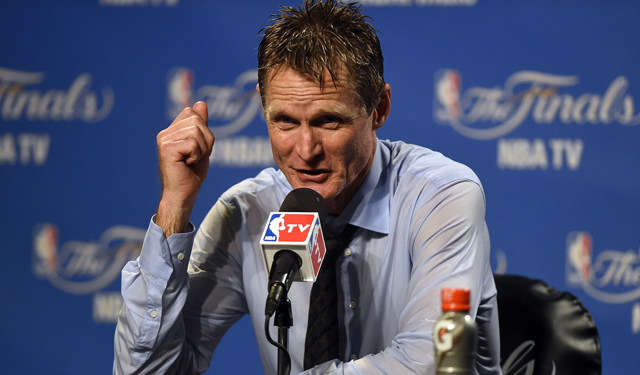
The pressure of replacing a 50-win coach and the fulfillment of a gamble
The preachiness of Jackson was both a gift and a curse. Jackson had become a deeply religious man after his playing career and used his gift as a preacher as a way to motivate his players. It grabbed the attention and the heart of many members of the team, but left a handful of players wanting more basketball strategy and less religion.
By the time the Warriors were eliminated in the first round of the 2014 playoffs, a decision had to come toward either putting differences aside and working out a contract extension with Jackson or firing him and finding his replacement who could take the team to the next level of success -- something the Warriors rarely were in a position to pursue. Lacob took the reins and fired Jackson, relieving him of his duties as coach and essentially sending him back to the broadcast table to call Warriors games instead of directing them.
The Warriors pursued Stan Van Gundy, but his insistence on buying the groceries and cooking the meal didn't connect with what the Warriors were looking for. They had a direction Myers had shaped with the construction of the roster and wanted a coach willing to share that vision and build with it. They managed to convince Steve Kerr to pass on coaching for Phil Jackson with the New York Knicks and be close to his family in California.
Following the Finals, Myers was asked what his favorite quote of legendary coach John Wooden is.
"It’s amazing what you can accomplish when no one cares who gets the credit," Myers recalled. "And I think that epitomizes our group."
That's not necessarily a knock on Jackson as much as it's an appreciation of the confidence Kerr was able to have in embracing a coaching role he had never filled before. The hiring of Kerr was followed up with the building of a brilliant coaching staff that is already being poached. Ron Adams came in to direct an already great defense. Alvin Gentry was brought in to help Kerr improve upon a set of offensive weapons that were underutilized. Luke Walton, Jarron Collins, and Bruce Fraser rounded out the coaching staff.
Shaun Livingston was the eventual replacement of Jarrett Jack, who left for the Cleveland Cavaliers in free agency in 2013. Brandon Rush was brought back to the roster and Leandro Barbosa joined a bench unit featuring unabashed scoring options like Marreese Speights. The Warriors were ready to be a great team on both ends of the floor.
The biggest decision Myers made was not chasing another superstar in trying to trade Klay Thompson for Kevin Love when the Minnesota Timberwolves were shopping him in the summer of 2014, and trusting Thompson would become his own star. By sticking with the plan and the versatility he had built with the roster, he was gambling on inaction instead of impulse.
But pressure was there to build upon Jackson's success and back-to-back playoff berths. Large sections of Bay Area media questioned the removal of Jackson and the replacement by Kerr. The Warriors were building a good thing, but why would a change in voice on the sidelines be the next step?
The risk of rocking the boat from a leadership standpoint and getting someone confident enough to not need to have all the answers paid off as well as possible. The first year of Kerr's coaching career saw his team win 67 wins, his staff provide brilliant adjustments they were openly given credit for, and a playoff run that ended in the championship. It was a feeling Kerr knew as a player -- having won five titles with the Chicago Bulls and San Antonio Spurs in his career -- but had to teach as a coach.
Kerr never needed the credit of winning; he just needed the wins.
It's a feeling the Warriors organization now has to get used to, celebrate, and then use as motivation to get back there.
"I was talking to Steve today," Myers said, "and you feel like you’ve got this ball inside your stomach throughout the whole playoffs and it’s such a long process. And I said if we win, what happens? And he said it all goes away. Mine’s kind of eroding; it hasn’t quite gone away."
Now the positionless, switching, 3-point shooting model the Warriors have built will become the standard for modern and progressive basketball. This is a copycat league and whatever becomes successful ends up getting replicated, ripped off, and sought after. The Warriors have built something special -- something that should be revered -- but are now in danger of being poached.
Their assistants and players will be looked at as must-have acquisitions. Draymond Green will be a restricted free agent and it will take a max deal for the Warriors to even consider not matching (they'll absolutely match it). Alvin Gentry has already been hired away as the new coach of the New Orleans Pelicans. But it's a feeling and a "danger' the Warriors' organization has to embrace and handle. This is their new identity as a franchise -- the gold standard of 2015 basketball.
"The thing that I’m struggling with is, I might’ve enjoyed this more as a fan," Myers admitted following the championship win. "Because in the position I’m in, you can’t let go. You’re wound tight. You have a job, and your job is to stay the course until you’re finally done.
"I’ll be a fan. I just haven’t gotten to that place yet."
And the impressive part of the new story of the Warriors franchise is it's only just now starting to be told.
